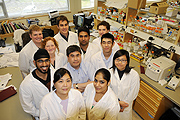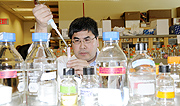December 3, 2009
|
Researchers at the University of Northern British Columbia have been collaborating with scientists in Italy and the United States to bring attention to a discovery in molecular biology that may have significant implications for the treatment of cancer.
For the past eight years, the researchers - led by UNBC biochemistry and molecular biology professor Chow Lee - have been investigating factors related to the growth and aggression of cancer cells. Recently, they have focused on a naturally occurring enzyme known as APE1. The work has led to collaboration with researchers at the University of Udine in Italy, and the National Institute of Health in the US. Together, they are highlighting the enzyme’s potential for cancer treatment in an article just published in the journals Molecular and Cellular Biology, and Nucleic Acids Research.
“What we found is that APE1 can cleave and destroy both messenger RNA and microRNA molecules,” says Dr. Lee. “Our findings have potential for health research because many newly discovered microRNA molecules are involved in a range of cancer and cardiovascular diseases.”
DNA is a capsule of genetic information, and RNA molecules are temporary copies of DNA. Messenger RNAs are used to make proteins which carry out most of a cell’s biological functions, and microRNAs are directly involved in the control of many cellular processes. An excessive amount of “bad” messenger RNAs and micro-RNAs cause cells to grow too quickly and invasively, which often leads to cancer.
“The fact that UNBC is participating in major studies that can lead to improvements in cancer treatment around the world is very exciting,” says Dr. Lee. “This research has the potential to be very beneficial for the treatment of cancer and other maladies. If nothing else, it could mean having to rewrite chapters in biochemistry and molecular biology textbooks. Local residents can take pride in the fact that research being conducted in their own backyard is making a difference in the world.”
Over the past eight years, 50 UNBC students and researchers have worked on the project in Dr. Lee's lab.
|
|
Media Downloads
Clickon a thumbnail below to access a high-resolution image.

Dr. Lee and his team of researchers

Dr. Chow Lee in his lab
|
Contact:
Dr. Chow Lee, Biochemistry and Molecular Biology Professor, UNBC - 250.960.5413
Michael Kellett, Communications Officer, UNBC - 250.960.5621

